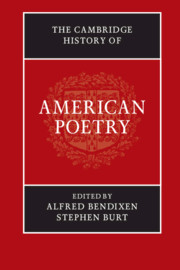28 results
Chapter 27 - Hawthorne and the American Gothic
- from Part IV - Hawthorne and Literary Traditions
-
-
- Book:
- Nathaniel Hawthorne in Context
- Published online:
- 26 November 2018
- Print publication:
- 15 November 2018, pp 317-328
-
- Chapter
- Export citation
2 - Romanticism and the American Gothic
- from Part I - Periods
-
-
- Book:
- The Cambridge Companion to American Gothic
- Published online:
- 20 November 2017
- Print publication:
- 23 November 2017, pp 31-43
-
- Chapter
- Export citation
Contents
-
- Book:
- The Cambridge History of American Poetry
- Published online:
- 05 December 2014
- Print publication:
- 27 October 2014, pp v-x
-
- Chapter
- Export citation
Part IV - Beyond Modernism: American Poetry, 1950–2000
-
- Book:
- The Cambridge History of American Poetry
- Published online:
- 05 December 2014
- Print publication:
- 27 October 2014, pp 821-1166
-
- Chapter
- Export citation
Introduction
-
-
- Book:
- The Cambridge History of American Poetry
- Published online:
- 05 December 2014
- Print publication:
- 27 October 2014, pp 1-12
-
- Chapter
- Export citation
Copyright page
-
- Book:
- The Cambridge History of American Poetry
- Published online:
- 05 December 2014
- Print publication:
- 27 October 2014, pp iv-iv
-
- Chapter
- Export citation
The Cambridge History of American Poetry - Half title page
-
- Book:
- The Cambridge History of American Poetry
- Published online:
- 05 December 2014
- Print publication:
- 27 October 2014, pp i-ii
-
- Chapter
- Export citation
Chapter 8 - The Emergence of Romantic Traditions
- from Part II - A New Nation: Poetry from 1800 to 1900
-
-
- Book:
- The Cambridge History of American Poetry
- Published online:
- 05 December 2014
- Print publication:
- 27 October 2014, pp 177-191
-
- Chapter
- Export citation
Acknowledgments
-
- Book:
- The Cambridge History of American Poetry
- Published online:
- 05 December 2014
- Print publication:
- 27 October 2014, pp xix-xx
-
- Chapter
- Export citation
Index
-
- Book:
- The Cambridge History of American Poetry
- Published online:
- 05 December 2014
- Print publication:
- 27 October 2014, pp 1197-1306
-
- Chapter
- Export citation
Part I - Beginnings: Poetry before 1800
-
- Book:
- The Cambridge History of American Poetry
- Published online:
- 05 December 2014
- Print publication:
- 27 October 2014, pp 13-152
-
- Chapter
- Export citation
Part II - A New Nation: Poetry from 1800 to 1900
-
- Book:
- The Cambridge History of American Poetry
- Published online:
- 05 December 2014
- Print publication:
- 27 October 2014, pp 153-494
-
- Chapter
- Export citation
Selected Bibliographies
-
- Book:
- The Cambridge History of American Poetry
- Published online:
- 05 December 2014
- Print publication:
- 27 October 2014, pp 1167-1196
-
- Chapter
- Export citation
The Cambridge History of American Poetry - Title page
-
-
- Book:
- The Cambridge History of American Poetry
- Published online:
- 05 December 2014
- Print publication:
- 27 October 2014, pp iii-iii
-
- Chapter
- Export citation
Notes on Contributors
-
-
- Book:
- The Cambridge History of American Poetry
- Published online:
- 05 December 2014
- Print publication:
- 27 October 2014, pp xi-xviii
-
- Chapter
- Export citation

The Cambridge History of American Poetry
-
- Published online:
- 05 December 2014
- Print publication:
- 27 October 2014
Part III - Forms of Modernism, 1900–1950
-
- Book:
- The Cambridge History of American Poetry
- Published online:
- 05 December 2014
- Print publication:
- 27 October 2014, pp 495-820
-
- Chapter
- Export citation
Part III - Social scenes and American sites
-
- Book:
- The Cambridge Companion to American Travel Writing
- Published online:
- 28 March 2009
- Print publication:
- 29 January 2009, pp -
-
- Chapter
- Export citation
Introduction: new worlds and old lands - the travel book and the construction of American identity
-
-
- Book:
- The Cambridge Companion to American Travel Writing
- Published online:
- 28 March 2009
- Print publication:
- 29 January 2009, pp 1-10
-
- Chapter
- Export citation
Chronology
-
- Book:
- The Cambridge Companion to American Travel Writing
- Published online:
- 28 March 2009
- Print publication:
- 29 January 2009, pp 244-278
-
- Chapter
- Export citation

